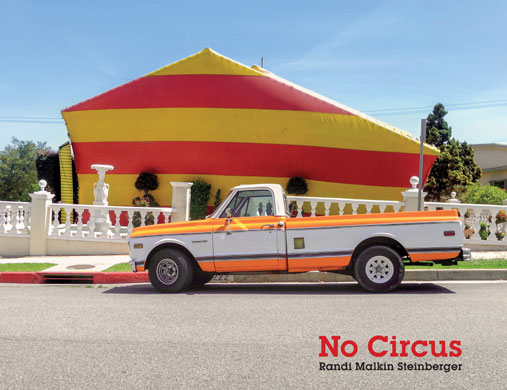No Circus
Damiani Books – Distributed by D.A.P.
Text by D.J. Waldie
[A] Ruschaean portrait of the particular strangeness of Los Angeles and its suburbs… The images fit snugly in the tradition of looking at the sun-stroked Southern California landscape as an alien terrain, the same surreal sweep that Bruce Davidson encountered when he shot palm trees growing in airport parking lots. – Max Lakin T: The New York Times Style Magazine
Everyone has looked twice at these big top monoliths but only Steinberger has looked again and again, transforming termite tents into public art with her gorgeous and obsessive eye. – Miranda July
Steinberger’s photographs capture both the playfulness and underlying unsettling feelings of these structures. Stripes of all color combinations fill the pages of her publication, the tangerine oranges, bumblebee yellows, and candy reds starkly sticking out against the greenery and flora of California. – Claire Voon Hyperallergic
At once material and imagined, fantastic and ordinary, Malkin Steinberger’s No Circus opens the door to a world which is absurd in its anxiety, delightful in its dissolution, and, perhaps, already just next door. – Sasha Patkin New York Photography Diary
An excerpt from Shrouded Houses by D. J. Waldie
The house we are born into is our first universe, “a real cosmos in every sense of the word” the phenomenologist Gaston Bachelard believed. That house may be all that we ever know of poetry, politics, or the temporality of space; the only place where we might have knowledge of what lies behind every door.
If it’s infested, the house is quarantined and made into a gas chamber. If it’s gone on the market to be sold, the home that faithfully sheltered must be certified by a licensed exterminator as fit to be lived in.
A tented house is the cosmos we’re turned out of, a lethal Eden, and the worst of our dreams. Formerly inhabitants, we’re made refugees.
A tented house has given up the struggle to be domestic. It’s become untenable.
Like some fabulous, fourth-dimensional shape, a tented house has no inside, only an outside.
Its limits have been trespassed, its intimacy profaned, its frailty exposed. It’s a carnival spectacle. Strangers now know what’s behind every door.
Tented, a house is disenchanted. It’s become a premature ruin. It’s no longer home. It’s a gaudy death trap.
The official who oversees law enforcement in my city warns me that a growing percentage of houses tented for fumigation in Southern California are robbed.
Thieves generally cut through the tent and enter the house by a window, left open to ventilate the gas when the termiting ends. Home security systems also have to be turned off to permit workers to enter and leave unhindered. The fumigation company isn’t responsible for security, and homeowners are urged to hire a security service. Some owners park a rented camper in front of the house and spend the next three days on guard.
Burglars take risks too. Some wear breathing masks and goggles to enter a tented house. Other thieves count on the relative safety of the third, least toxic day of tenting. They just cover their mouth and nose with the sweatshirt they’re wearing and trust in speed.
There are miscalculations. In 2014, as workers returned to untent a house not far from mine, an intruder was found dead inside. He had apparently died from the gas.
But the appeal of a vulnerable house outweighs the risks. When a man and woman were questioned about a recent burglary by the police department, they said that the crime was so easy, it was “like going to the circus.”
Dwelling describes both the shelter and the sheltered. Apart, both the unhoused and the uninhabited are at terrible risk.
Fled from, sealed up, pumped full of poison, abandoned by everyone except opportunistic thieves, the tented house waits like Lazarus in his tomb. The nights are darker. The sun only half lights the rooms.
To be something more than a windbreak or a covering from rain or a frail barrier, a home must have dreamers inside. A house undreamed in is already neglected.



